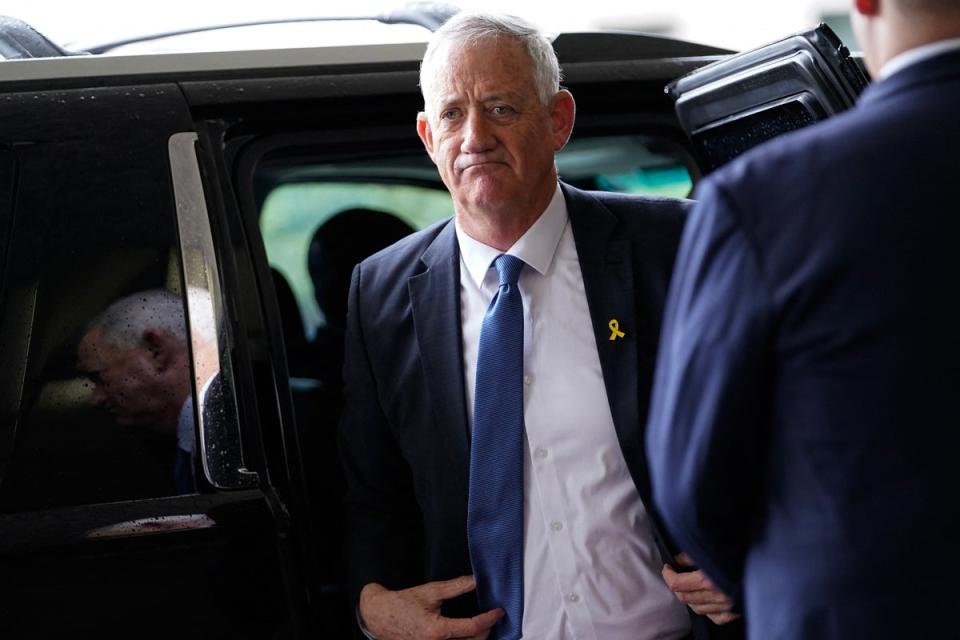Israel steps up shelling of Rafah as splits deepen in Netanyahu’s war cabinet
There has been intense shelling and gunfire in the Gaza border city of Rafah in the wake of Israel saying it is now in effective control of Gaza’s entire land border, having taken over key a buffer zone along the border with Egypt.
Palestinian medics said that at least 12 Palestinians had been killed in a dawn airstrike on Rafah. Israel’s military said there had been clashes in southern, central and northern Gaza but did not immediately comment on the reported deaths in Rafah, where hundreds of thousands of displaced Palestinians are sheltering.
Communication services were also cut in the southern city on Thursday evening because of “the ongoing aggression”, Palestinian telecommunications company Jawa said in a statement.
The Israeli military has continued its offensive on Rafah despite an order from the UN’s top court, the International Court of Justice (ICJ), to end attacks on the city, where half of Gaza’s 2.3 million people had previously taken refuge.
In a televised briefing, chief military spokesperson Daniel Hagari said Israeli forces had gained “operational” control over the “Philadelphi Corridor”, using the Israeli military’s codename for the 14 km (9 mile) corridor along the Gaza Strip’s only border with Egypt. “The Philadelphi Corridor served as an oxygen line for Hamas, which it regularly used to smuggle weapons into the area of the Gaza Strip,” Mr Hagari said.
Israel’s war in Gaza was triggered by a Hamas attack inside Israel on 7 October, during which around 1,200 people were killed and another 250 were taken into Gaza as hostages. More than 36,000 Palestinians have been killed in the subsequent Israeli bombardment, according to health officials in the Hamas-run territory.
Mr Hagari did not spell out what “operational” control referred to, but an Israeli military official earlier said there were Israeli “boots on the ground” along parts of the corridor.
International pressure has been growing over the Rafah offensive, while Israeli prime minister Benjamin Netanyahu has seen splits emerge in his war cabinet. The National Unity party, which is led by Benny Gantz – a member of that cabinet – proposed a bill on Thursday to dissolve parliament, showing the growing strain between factions within Mr Netanyahu’s government, even if the prime minister has enough MPs to keep him in office.

The move follows an ultimatum Mr Gantz issued in May, demanding that Mr Netanyahu agree to a “day after” plan for the Gaza war by 8 June. He threatened to quit the coalition if no such agreement was forthcoming, although the prime minister’s Likud party and hard-right allies still have a majority of seats without Mr Gantz, who joined Mr Netanyahu’s government shortly after the October attack.
“The seventh of October was a disaster that requires us to go back and get the people’s trust, establish a broad and stable unity government to lead us safely through the tremendous challenges in security, in the economy and, most importantly, in the Israeli society,” Pnina Tameno, a legislator from the National Unity party, said in a statement. “Proposing the bill now will allow us to raise it in the current session,” she added.
Mr Netanyahu’s Likud party responded by saying that disbanding the government would hurt the war effort and deal a “fatal blow” to efforts to free around 120 hostages who are still being held in Gaza. National Unity then issued a second statement, which blamed Mr Netanyahu for dismantling the government but said there was still time to find some middle ground.
“Netanyahu, it’s not too late to come to your senses – either together we are victorious or you continue alone with the method of ‘divide and rule’,” it read.
Mr Gantz has emerged as Mr Netanyahu’s main political rival since the Hamas attack, with recent opinion polls showing he would receive the most votes should a snap election be held. His party, however, has just eight seats in parliament out of 120, and Mr Netanyahu’s original right-wing coalition controls a comfortable majority, with 64 seats.
Internationally, Slovenia’s government has endorsed a motion to recognise a Palestinian state and has asked the country’s parliament to do the same.
Prime minister Robert Golob said his government had sent the recognition proposal to parliament, which could convene as early as next week. “All the world should act in the direction of peace,” Mr Golob said after the government session.
“The way to achieve peace is a two-state solution ... The decision is not directed against anyone, not even Israel, but that it is a message of peace,” he added, as the Palestinian flag was displayed on the government headquarters in Ljubljana, the Slovenian capital.
Parliamentary approval is necessary for the motion to take effect, but Mr Golob’s ruling liberal coalition has a comfortable majority in the 90-member assembly, and the vote should be a formality.
The decision by Slovenia’s government comes just two days after Spain, Norway and Ireland recognised a Palestinian state, in a move that was condemned by Israel.
With its motion, Slovenia is set to become the 10th member of the 27-nation European Union to officially recognise a Palestinian state. Norway is not an EU member, but its foreign policy is usually aligned with that of the bloc.
Israel’s foreign minister denounced the Slovenian government’s decision. Israel Katz said the decision rewarded Hamas for murder, and that it also strengthened Israel’s arch-enemy Iran while damaging “the close friendship between the Slovenian and Israeli people”. He added: “I hope the Slovenian parliament rejects this recommendation.”
Reuters and Associated Press contributed to this report

 Yahoo News
Yahoo News 
